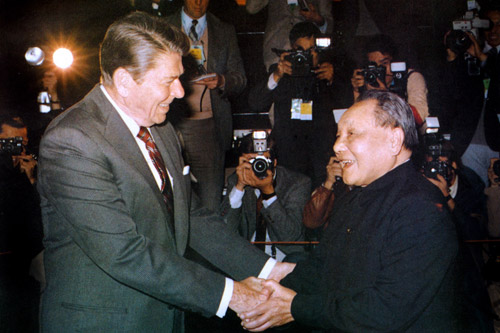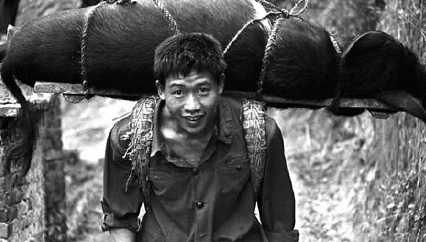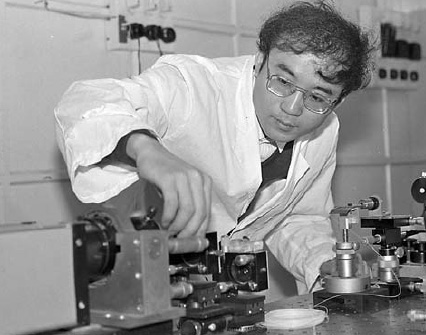Society
The past is another country as reports take us back in time
By Duan Yan, Wang Yan, Hu Yinan, Cui Jia, He Na, Hu Yongqi, Xu Wei and Zhang Yuchen (China Daily)
Updated: 2011-05-31 07:59
 |
Large Medium Small |
China-US Relations
 |
|
Chinese leader Deng Xiaoping and US President Ronald Reagan meet in Beijing in April 1984. China News Service |
China and the United States established diplomatic relations in 1979. Ronald Reagan was sworn in as US president in 1981, the year that the expanding China-US relationship was threatened by US arms sales to Taiwan.
On Jan 4, Chinese leader Deng Xiaoping emphasized the importance of the Taiwan question, saying it was the key to developing China's relationship with the United States, Japan and other countries.
Reports from the West
President Reagan had his first long talk with a real live Chinese Communist last week. Two, to be exact: China's ambassador to Washington and the American-educated head of China's America department. No conversion resulted on either side. But the president had already been persuaded that reaffirming "normal" relations with China is a strategic priority and incompatible with his campaign pledge to put an official label on ties with Taiwan.
. . . China is not now pushing for any positive rewards from an administration it still regards with suspicion. Its minimum demand of the United States is that the relationship in which it has invested so heavily be prevented from regressing . . . Diminishing returns on China's American links could be exploited by opposing factions to devalue Mr Deng Xiaoping's entire opening to the West.
"America and China: Big must be best"
The Economist
March 28, 1981
Sen. John Glenn (D-Ohio) said here today that China's leaders believe Washington had agreed implicitly in 1978 to slash or stop weapons sales to Taiwan after Sino-American relations were normalized in 1979.
. . . US officials say both sides had agreed in 1978 to shelve the complex Taiwan issue and go ahead with establishment of diplomatic relations in the hope that friendlier bilateral relations would facilitate a later solution.
"China said to believe US reneged on deal"
The Washington Post
Aug 18, 1981
Despite the optimistic figures, (Commerce Secretary Malcolm) Baldrige said, some American firms have lost business because of China's recent economic readjustment policies . . . He also indicated U.S. businesses needed more information about the Chinese economy and that nation's economic organizations.
"U.S.-China trade commission proposed"
The Associated Press
June 4, 1981
Current comments
Wang Yusheng, a Beijing-based researcher and former Chinese diplomat, said China-US relations have experienced rain and sunshine over the years. "The relations differ as time changes, but there is something of each other between the two nations.
"Compared with 30 years ago, China-US relations have made it to a level where both sides treat each other equally. Only when the US took China as a partner in cooperation could it make a friend and avoid making an enemy."
Poverty
 |
|
A young man shoulders a pig to sell in a local market in Xilingxia, Hubei province, in 1982. Wang Wenlan / China Daily |
China has achieved strong and sustained economic growth since the 1980s, but poverty persists, especially in remote rural areas. Even so, according to the World Bank, from 1981 to 2007, the proportion of China's population living in poverty fell from 65 percent to 4 percent.
Report from the West
Beggars in the southern city of Canton (Guangdong) tend to congregate at the railroad station, parks and hotels. Some are streetwise children who play on the sympathies of passers-by, especially foreigners.
All explanations point to the nationwide problem of unemployment, which the central government still has yet to solve.
Foreigners seldom see beggars in Peking. During the harsh winter in the north, many beggars hop freight trains and head south for warmth, food and possible work, a Chinese student explained.
"China's unemployment brings return of beggars"
United Press International
April 17, 1981
Current comments
Lu Linhui, a professor in Peking University's social sciences department, said China set up an anti-poverty office in 1986 and "without a doubt, the office has done a great job in helping people shake off poverty. What's worrying is that the income gap between the rich and poor is wider than ever. China should really adjust its economic structure to shorten the gap. Otherwise, more people will fall into poverty than get out of it."
Study Overseas
 |
|
Jiang Zhiping, a professor in Xiamen University, conducts photon tests in the laboratory after finishing his PhD in France in 1989. Xinhua |
About 8,000 Chinese left for overseas studies in 1981. Meanwhile, there were nearly 2,000 foreign students in Chinese colleges, and some 500 foreign teachers of language and social science. The Test of English as a Foreign Language was given for the first time in China, and 732 people took part.
Reports from the West
These foreign teachers have been generally praised as being competent, hard working and friendly to the Chinese people.
"Expansion of overseas educational ties"
British Broadcasting Corp
June 17, 1981
Some of the Chinese students have managed to adapt to life here with astonishing ease, but most have remained isolated and alienated from American society.
"China's leap to American campuses"
The New York Times
Nov 15, 1981
Current comments
Chu Zhaohui, China National Institute for Educational Research: "In the early 1980s, both foreign students in China and Chinese students overseas were mainly sponsored by the government. Not many individuals could dream about going abroad to study on their own."
| 分享按钮 |